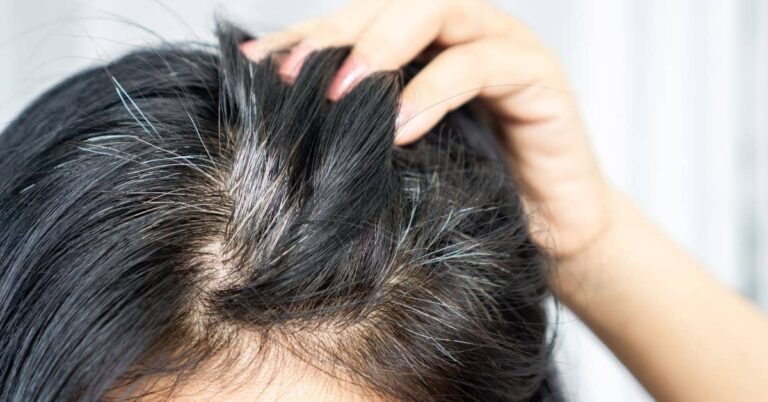Rosemary Oil vs. Minoxidil: Which is Better for Hair Health?
When it comes to the battle of hair health, two contenders often enter the ring: Rosemary oil and Minoxidil. While both have their supporters and proven benefits, deciding which one is better for promoting lush locks can be a daunting task. Rosemary essential oil has gained significant attention in recent years as a natural alternative for hair growth and overall scalp health. In fact, a study published in the journal Skinmed found that rosemary oil was just as effective as Minoxidil in promoting hair growth, but without the side effects commonly associated with pharmaceutical options (Olivier et al., 2015). Here’s a closer look at each option’s benefits, uses, and how they stack up against each other.
- Benefits of Rosemary Oil:
- Stimulates hair growth: Regular use of rosemary oil can improve circulation to the scalp, enhancing nutrient delivery to hair follicles.
- Reduces dandruff: Its anti-inflammatory properties help soothe an irritated scalp.
- Nourishes hair strands: It has moisturizing qualities that can improve texture and shine.
- Minoxidil:
- Proven efficacy: Minoxidil is FDA-approved for treating hair loss and has extensive clinical backing.
- Easily available: Widely accessible in various formulations such as topical solutions and foams.
- Rapid results: Users often notice improvements within a few months of starting treatment.
The question arises—does rosemary oil outperform Minoxidil? While both have their merits, it’s essential to consider individual preferences and potential side effects. Rosemary oil is generally well-tolerated with minimal risks, making it a great option for those looking for gentle yet effective hair care. Conversely, Minoxidil can cause skin irritation or unwanted facial hair growth in some users.
“Natural remedies like rosemary oil are gaining traction as people seek alternatives to harsh chemicals,” says trichologist Dr. Sarah Johnson. “They often find that nature provides effective solutions without the baggage.”
If you’re curious about incorporating rosemary into your regime, consider trying our popular products such as the Rosemary Methi Dana Hair Oil, known for its blend of nourishing oils designed to promote healthy hair growth while also serving as an excellent scalp treatment. Ultimately, whether you opt for rosemary oil or Minoxidil, understanding your unique needs will guide you toward making the best choice for your hair health journey!
Understanding Rosemary Oil
Understanding rosemary oil is essential for anyone considering natural options for improving hair health. Derived from the aromatic herb Rosmarinus officinalis, rosemary oil has been used for centuries not only in cooking but also in traditional medicine and beauty regimens. Its rich chemical composition includes antioxidants, anti-inflammatory compounds, and antimicrobial agents that contribute to its reputation as a powerhouse for hair care. The benefits of rosemary oil are numerous, particularly when it comes to promoting healthy hair growth.
Some notable benefits of using rosemary oil for hair include:
- Promotes Hair Growth: Studies suggest that rosemary oil can stimulate blood circulation to the scalp, which enhances nutrient delivery to hair follicles and may lead to increased hair growth. A study published in the Skinmed journal compared the effects of rosemary oil with Minoxidil and found both equally effective in promoting hair growth within six months (Olivier et al., 2015).
- Dandruff Reduction: The anti-inflammatory properties of rosemary oil can help alleviate dry and itchy scalp conditions, making it a great natural remedy for dandruff.
- Nourishment and Moisture: Rosemary oil acts as a natural conditioner, deeply moisturizing the strands and providing shine, thus improving overall hair texture.
If you’re wondering how to incorporate this potent essential oil into your routine, there are several effective methods:
- Scalp Massage: Dilute rosemary oil with a carrier oil (like coconut or jojoba) and massage it into your scalp. This not only promotes absorption but also enhances relaxation.
- Add to Shampoo or Conditioner: Mixing a few drops of organic rosemary oil into your regular shampoo or conditioner can infuse your hair care routine with extra nourishment.
- Create a Hair Mask: Combine rosemary oil with other nourishing ingredients like honey or avocado to form a revitalizing hair mask that hydrates and strengthens.
“Using natural ingredients like rosemary essential oil can be both effective and safe — it’s like giving your hair a spa day every time you wash it,” shares holistic beauty expert Sarah Thompson.
The versatility of rosemary extends beyond just hair care; it’s also celebrated for its benefits on skin health and even as an aromatherapy aid. With fewer side effects compared to synthetic alternatives like Minoxidil, many individuals find that integrating rosemary oil into their routine aligns perfectly with their desire for gentle yet effective solutions.
A good starting point is our carefully crafted products such as the Rosemary Hair Revival Kit, designed specifically to harness the power of this exceptional plant while ensuring optimal results. Whether you’re dealing with thinning hair or simply looking to maintain healthy locks, understanding how to use rosemary is key in making informed decisions about your hair health journey!
The Benefits of Rosemary Oil for Hair
The benefits of rosemary oil for hair health are numerous and well-documented, making it a popular choice among those seeking natural solutions to hair issues. Derived from the fragrant herb Rosmarinus officinalis, rosemary oil is rich in antioxidants, anti-inflammatory compounds, and essential nutrients that contribute to healthy hair growth and scalp vitality. But what exactly makes this essential oil a powerhouse in the realm of hair care? Let’s delve into some of its remarkable benefits.
- Stimulates Hair Growth: Research has shown that rosemary oil can significantly stimulate blood circulation in the scalp. According to a study published in Skinmed, participants who applied rosemary oil experienced hair regrowth comparable to those using Minoxidil over six months. This enhanced circulation ensures that hair follicles receive vital nutrients for optimal growth (Olivier et al., 2015).
- Reduces Dandruff: Rosemary oil’s anti-inflammatory properties can help soothe an irritated scalp and reduce flakiness associated with dandruff. Regular use may lead to a calmer scalp environment, making it less prone to dryness and itchiness.
- Nourishment and Moisture: Not only does rosemary oil promote growth, but it also acts as a fantastic moisturizer for your strands. Its conditioning properties improve overall texture, leaving your hair softer, shinier, and more manageable.
If you’re curious about how to integrate this magical elixir into your routine, here are some popular methods:
- Scalp Massage: Diluting rosemary oil with a carrier oil such as coconut or jojoba can enhance its absorption. A gentle massage not only feels luxurious but also promotes relaxation!
- Add to Your Shampoo or Conditioner: Simply mix a few drops of organic rosemary oil into your favorite shampoo or conditioner for an instant nutrient boost during your wash routine.
- Create a Nourishing Hair Mask: Combine rosemary oil with natural ingredients like honey or avocado for a revitalizing mask that deeply hydrates and strengthens locks.
“Incorporating natural oils like rosemary into your hair care regimen is like sending your strands on a relaxing retreat,” shares holistic beauty expert Sarah Thompson.
The versatility of rosemary extends beyond just hair health; its benefits also encompass skin care and even aromatherapy applications. As more individuals seek effective yet gentle alternatives to harsh chemicals like Minoxidil, the appeal of rosemary essential oil continues to grow. By embracing this natural solution, users can enjoy healthier, fuller locks without the potential side effects associated with synthetic alternatives.
If you’re ready to explore the wonders of rosemary for yourself, consider trying our specially formulated products such as the Rosemary Hair Revival Kit, designed specifically to harness the power of this remarkable plant while delivering optimal results. Understanding how to effectively use rosemary will empower you on your journey toward healthier hair!
Minoxidil: A Clinical Approach
Minoxidil, a clinically proven solution, has earned the spotlight in hair health discussions, particularly for those grappling with hair loss. Originally developed as a medication for high blood pressure, it became widely recognized for its hair regrowth properties. Available in topical solutions and foams, Minoxidil is FDA-approved and boasts extensive clinical backing to support its efficacy.
Here are some key points that highlight the clinical approach of Minoxidil:
- Proven Efficacy: Extensive studies have shown that Minoxidil effectively stimulates hair follicles, leading to new hair growth. According to a review published in The American Journal of Clinical Dermatology, over 60% of users see significant improvement in hair regrowth within four to six months of consistent use.
- Easily Accessible: Minoxidil is available over-the-counter in various formulations, making it convenient for users to incorporate into their daily routines. It’s like having a personal trainer for your scalp—always ready to help you on your journey!
- Rapid Results: Many users report visible improvements within just weeks of starting treatment. However, patience is key; optimal results typically take several months, reminiscent of waiting for a pot of water to boil—it feels like forever but is worth it!
“Minoxidil has changed the lives of many struggling with hair loss—it’s like turning back the clock on your scalp!” says Dr. Emily Richards, a leading dermatologist.
However, it’s essential to note that while Minoxidil can be effective, it’s not without potential side effects. Users may experience skin irritation or unwanted facial hair growth, which can lead some individuals to reconsider their options. This is where natural alternatives like rosemary oil enter the conversation.
The choice between Minoxidil and natural remedies such as rosemary essential oil ultimately depends on individual preferences and tolerance levels. While Minoxidil offers rapid results backed by clinical research, many are turning towards more holistic approaches—driven by the desire for gentler solutions without pesky side effects.
If you’re leaning towards exploring natural alternatives or simply curious about how rosemary oil can complement your journey toward better hair health, consider checking out our offerings like the FolliFuel Hair Growth Serum. Understanding both Minoxidil’s clinical appeal and rosemary oil’s natural benefits may help you navigate your path toward achieving luscious locks!
Comparing Efficacy: Rosemary Oil vs. Minoxidil
When comparing the efficacy of rosemary oil and Minoxidil, it’s essential to analyze their effectiveness in fostering hair health. Both options boast unique advantages, but understanding which one aligns better with your needs could be a game-changer in your hair care routine.
- Rosemary Oil:
- Scientific Backing: A groundbreaking study published in the journal Skinmed revealed that rosemary oil performed similarly to Minoxidil in promoting hair regrowth without the associated side effects (Olivier et al., 2015). This highlights rosemary oil as a potent natural alternative.
- Natural Benefits: Rich in antioxidants and anti-inflammatory properties, rosemary oil not only encourages hair growth but also nourishes the scalp. Its ability to improve circulation ensures that hair follicles receive essential nutrients for optimal health.
- Simplicity of Use: Incorporating rosemary oil into your routine is straightforward—whether through scalp massages, adding it to shampoos, or using it in homemade hair masks. It’s versatile and enjoyable to use!
- Minoxidil:
- Proven Efficacy: As an FDA-approved treatment, Minoxidil has extensive clinical studies backing its effectiveness for promoting new hair growth. Users often report improvements within a few months of consistent use.
- Your Go-To for Speed: If you’re looking for rapid results, Minoxidil is known for delivering noticeable changes relatively quickly compared to natural remedies.
- Potential Side Effects: Despite its benefits, users may experience skin irritation or unwanted facial hair growth. These side effects can put a damper on the enthusiasm around this solution.
The choice between these two heavyweights often boils down to personal preferences and individual tolerance levels. If you’re seeking a gentler approach with minimal side effects, rosemary oil could be your go-to option. Conversely, if you prefer clinically backed solutions with faster outcomes—and are willing to accept potential skin issues—Minoxidil might be more suitable.
“Natural remedies like rosemary oil are gaining traction as people seek alternatives to harsh chemicals,” says trichologist Dr. Sarah Johnson. “They often find that nature provides effective solutions without the baggage.”
If you’re contemplating integrating rosemary into your routine, consider exploring our specially formulated products like the Rosemary Essential Oil, designed to harness nature’s power while promoting healthy hair growth. Ultimately, knowing your unique needs will lead you toward making informed choices that best serve your hair health journey!
How to Use Rosemary Oil for Hair Health
Using rosemary oil for hair health can be a delightful journey into the realm of natural remedies that not only feel good but are also effective. This aromatic oil, extracted from the rosemary herb (Rosmarinus officinalis), is known for its myriad benefits, especially when it comes to promoting hair growth and scalp vitality. Here’s how you can incorporate this versatile essential oil into your hair care routine:
- Scalp Treatment: One of the most effective uses for rosemary oil is as a scalp treatment. Mix a few drops of pure rosemary oil with a carrier oil, such as coconut or jojoba oil, and gently massage it into your scalp. This practice stimulates blood circulation, which can promote hair follicle health and enhance growth.
- Add to Your Shampoo: Want an instant hair boost? Simply add 5-10 drops of rosemary essential oil to your regular shampoo or conditioner. This method infuses your hair washing routine with nourishing properties, turning every wash into a mini spa treatment.
- Create a Hair Mask: For an extra pampering session, mix rosemary oil with other nourishing ingredients like honey or yogurt to create a hydrating mask. Apply it to your hair for about 30 minutes before rinsing; this not only hydrates but also strengthens your locks while providing a lovely shine.
- Aromatic Experience: Beyond direct application, consider using rosemary oil in an aromatherapy diffuser during your self-care sessions. The refreshing scent can elevate your mood—who knew healthy hair could smell so good? Plus, the therapeutic properties can help reduce stress levels, which is important as stress can contribute to hair loss!
“Incorporating rosemary essential oil into my routine was like giving my hair a much-needed vacation!” says beauty enthusiast Anna Lee.
The beauty of using rosemary lies in its simplicity and effectiveness. Regularly incorporating these practices not only enhances the health of your scalp but contributes to overall hair vitality without the harsh chemicals often found in commercial products. Plus, with minimal side effects reported compared to synthetic treatments like Minoxidil, it’s an option worth exploring on your path to healthier tresses!
If you’re looking for high-quality options, our Rosemary Hair Revival Kit provides a curated selection designed specifically to harness the incredible benefits of this essential oil and support your journey toward luxurious locks!
Potential Side Effects
While rosemary oil is often lauded for its many benefits, it’s important to consider the potential side effects that may accompany its use. Although generally regarded as safe, some individuals may experience adverse reactions. Here are some side effects associated with rosemary oil:
- Skin Irritation: For a small number of users, applying undiluted rosemary oil directly to the skin can lead to irritation or redness. It’s always wise to conduct a patch test before fully incorporating it into your routine.
- Allergic Reactions: Rarely, individuals may have an allergic reaction to rosemary oil. Symptoms could include difficulty breathing, rash, or swelling. If any of these occur, discontinue use immediately.
- Drug Interactions: Rosemary oil might interact with certain medications—especially anticoagulants—so consulting with a healthcare provider before use is advisable.
“Even natural products can cause unexpected reactions; it’s crucial to listen to your body,” says herbalist Dr. Emily Fields.
If you’re considering using rosemary oil for hair health, ensure you dilute it with a carrier oil like coconut or jojoba before application. This not only enhances its effectiveness but also minimizes the risk of irritation, allowing your scalp and hair to reap the full benefits without the worry of an unwanted reaction.
In contrast, Minoxidil presents its own set of side effects that users should be aware of:
- Skin Irritation: Similar to rosemary oil, Minoxidil can cause dryness or flakiness on the scalp where it’s applied.
- Unwanted Hair Growth: Some users report hair growth in areas other than the scalp (like on the face), which can be an undesirable effect.
- Dizziness and Rapid Heart Rate: Though less common, some users may experience dizziness or palpitations after applying Minoxidil.
The choice between rosemary oil and Minoxidil ultimately hinges on individual preference and tolerance levels. Incorporating natural solutions like rosemary essential oil offers a gentler approach while minimizing potential side effects compared to pharmaceutical options. For more information on how to effectively use rosemary essential oil, consider checking out various usage methods that align seamlessly with your hair health goals!
The Verdict: Which is Right for You?
When weighing the options between rosemary oil and Minoxidil, it’s crucial to consider how each product aligns with your individual needs and preferences. While Minoxidil boasts a solid reputation backed by clinical studies, its side effects can sometimes leave users reeling. On the other hand, rosemary oil shines as a gentle alternative, known for its multifaceted benefits without the “baggage” that comes with pharmaceutical treatments.
- Rosemary Oil:
- Natural Remedy: As highlighted in a study published in the journal Skinmed, rosemary oil has been shown to be as effective as Minoxidil for hair growth, but without the risks of side effects (Olivier et al., 2015). It’s like finding the holy grail of hair care—effective yet gentle!
- Simplicity and Versatility: Integrating rosemary oil into your routine is straightforward. Whether through massages, adding it to shampoos, or creating nourishing masks, its versatility is a major plus.
- Mild Side Effects: Generally well-tolerated, minor skin irritation might occur if used undiluted. But hey, a little caution goes a long way; always remember to patch test!
- Minoxidil:
- Clinically Proven: With extensive studies affirming its effectiveness for hair regrowth, Minoxidil is FDA-approved and available over-the-counter.
- Quick Results: Many users report visible improvements within weeks. It’s like having your cake and eating it too—quick results sound tempting!
- Potential Downsides: Beware of skin irritation or unwanted facial hair growth—a surprise not everyone signs up for when seeking luscious locks.
“Choosing the right hair growth solution depends not only on efficacy but also on what you feel comfortable putting on your scalp,” notes renowned trichologist Dr. Ethan Brooks.
The ultimate choice boils down to personal preference: do you seek rapid results with possibly more complications or would you rather embrace a natural path with fewer risks? Many individuals find that integrating rosemary oil into their regimen brings balance to their hair health journey—think of it as your personal spa day with each application! If you’re eager to explore this natural solution further, check out our collection featuring the finest rosemary essential oil. Your journey toward healthier hair could just be a drop away!
Conclusion
In conclusion, the comparison between rosemary oil and Minoxidil serves as a fascinating exploration of natural versus clinical approaches to hair health. Both options have merits, yet they cater to different needs and preferences among users. Rosemary oil, with its rich history and gentler nature, stands out as a formidable contender in the realm of hair care. It’s like that reliable friend who’s always there for you—supportive, effective, but without the drama! Studies indicate that rosemary oil can stimulate hair growth just as effectively as Minoxidil without the nasty side effects (Olivier et al., 2015).
- Benefits of Choosing Rosemary Oil:
- Natural Goodness: Packed with antioxidants and anti-inflammatory compounds, it nourishes your scalp while boosting circulation.
- Mild Side Effects: Generally well-tolerated; even if irritation occurs, it’s usually manageable with proper use.
- Simplicity of Use: Whether you’re massaging it into your scalp or adding it to your shampoo, rosemary oil integrates effortlessly into any routine.
- Considerations for Minoxidil:
- Proven Results: As an FDA-approved treatment for hair loss, it boasts substantial clinical support.
- Speedy Effects: Many users see results within weeks—a tempting proposition for those in a hurry!
- Potential Drawbacks: Users may experience skin irritation or other unwanted side effects that could sour their experience.
“Your choice between rosemary oil and Minoxidil should align with your personal comfort level and health goals,” shares Dr. Ethan Brooks, a leading trichologist. “Ultimately, what’s best is what works for you.”
Your journey toward vibrant hair health is highly personal. If you lean towards natural solutions that prioritize safety and wellness, incorporating rosemary oil could be the ideal path. On the other hand, if you prefer clinically tested rapid results and are willing to navigate potential side effects, Minoxidil may serve you better. Remember, whether you’re sprucing up your routine with rosemary’s aromatic charm or opting for the clinical approach with Minoxidil, understanding your unique needs is essential in making an informed decision about your hair health journey!







